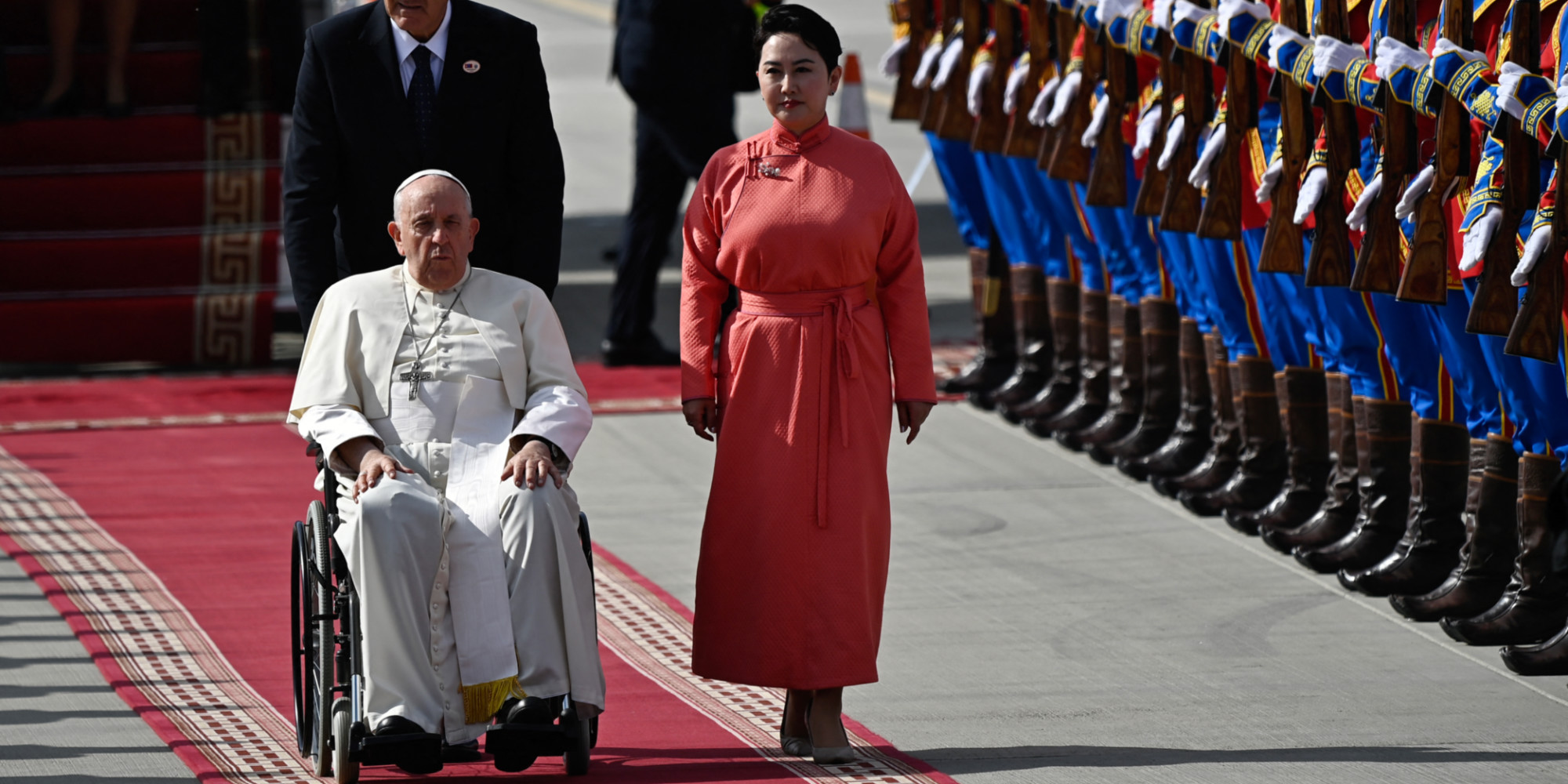Pope Francis arrived in Mongolia on Friday, the first pontifical visit to this vast, isolated nation in Asia, wedged between the two superpowers of China and Russia. The papal plane landed in Ulaanbaatar shortly before 10 a.m. (0200 GMT), and the pope was greeted by a line of Mongolian honor guards in traditional blue, red and yellow attire.
A gesture of support for the small community of Catholics
The visit of the 86-year-old pontiff until Monday to this predominantly Buddhist country is a gesture of support for the small community of Catholics which has around 1,400 faithful for more than three million inhabitants.
But this trip – Francis’s second to the region in a year after that of September 2022 to Kazakhstan – is also strategic in the geopolitical context. “This is a clear effort by the Holy See to take care of Central Asia and not abandon it to Russia or China”, analyzes for AFP Michel Chambon, specialist in Catholics in Asia.
Asked by a reporter on the papal plane if he finds diplomacy difficult, the pope replied, “Yes, you don’t know how difficult it is.” “Sometimes you have to have a sense of humor.” As the plane flew over China, the pope sent a telegram of “good wishes” to President Xi Jinping and the Chinese people. “Assuring you of my prayers for the well-being of the nation, I invoke upon you all the divine blessings of unity and peace,” he wrote in the telegram, following the tradition of greeting the leaders of the countries whose airspace it crosses.
This trip is a test of endurance for the pope
This trip, the 43rd in a decade at the head of the Catholic Church, is also crucial for the Vatican’s relations with Beijing and Moscow, where Francis has not yet been invited. “It’s a way not to give up, to remind them that + I’m here +”, according to Mr. Chambon. “It’s a way of not staying in Rome and waiting for things to happen, but of jumping into the water”.
This trip is a test of endurance for the pope, who continues to travel a lot despite an abdominal hernia operated on in June and knee pain that forces him to move around in a wheelchair.
On the program, meetings with the President and the Prime Minister
After a day of rest, the pontiff’s itinerary will include a welcome ceremony, meetings with President Ukhnaa Khurelsukh and Prime Minister Luvsannamsrai Oyun-Erdene, as well as a first address to authorities, diplomats and members of the civil society.
He will meet the Catholic community – which has only 25 priests and 33 nuns, including only two Mongols – on Saturday in the Saints Peter and Paul Cathedral, whose circular nave resembles a “ger”, the traditional tent of Mongolian nomads .
The Jesuit pope will address an inter-religious meeting on Sunday, which the rector of the Russian Orthodox Church of Ulaanbaatar is expected to attend with a delegation, and then preside over a Mass at a recently ice hockey arena. built. Pilgrims from neighboring countries are expected to attend Mass, the Vatican said, including from Russia, China, South Korea, Thailand, Vietnam, Kazakhstan, Kyrgyzstan and Azerbaijan.
Mongolia depends on Russia and China
Once an integral part of Genghis Khan’s empire, Mongolia depends on Russia for its energy imports and China for the export of its raw materials, mainly coal. But while remaining neutral vis-à-vis its powerful neighbours, it has engaged in a “third neighbour” policy, strengthening its relations with other nations, notably the United States, Japan and South Korea. South, for the sake of balance.
This makes Mongolia potentially useful for relations between the Vatican and Beijing, with which the Holy See last year renewed an agreement on the thorny issue of bishop appointments. With Moscow, Francis sought to negotiate an end to the war in Ukraine.
The Pope could use his trip to the former satellite state of the Soviet Union, which has only been a democracy since 1992, to insist on democratic principles. A major coal industry corruption scandal sparked street protests in December, eroding public trust amid a weak economy, high inflation and wide gaps between rich and poor .
Chambon, a fellow at the Asia Research Institute in Singapore, says Francois could draw inspiration from his visit to Kazakhstan last year, during which he reminded authorities of their good governance obligations. “The pope does not take sides, but confronts politicians with their responsibilities: who do we serve, are we honest, do we take care of the poor and the marginalized, do we take care of the whole nation in its religious diversity and ethnic? “He plays the game, but he asks the difficult questions”, recalls the researcher.
The pope could again sound the alarm on the effects of climate change
François, who plans to publish an update to his 2015 environmental encyclical “Laudato Si” in October and could once again sound the alarm about the effects of climate change, particularly visible in Mongolia. Along with mining and overgrazing, rising temperatures and its effects are fueling desertification over large swaths of Mongolian territory.
Intense cold, floods and drought have decimated herds in the vast grasslands, forcing nomads, who make up a third of the population, to migrate to Ulaanbaatar, now surrounded by slums inhabited by displaced herders.
